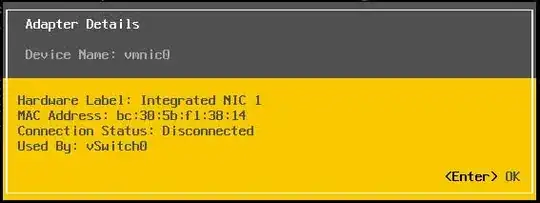i´ll need your help. I set up an Network with Debian 9.3.0.
The target of this project is that i can boot Clients in the Network B. So i set up an Router with 2 NICs configured them to
Network A:--------------DebianRouter:-------Network B
40.4.200.0/24----------10.5.200.254/24-----10.5.200.0/24
dhcp.conf-->
# This file describes the network interfaces available on your system
# and how to activate them. For more information, see interfaces(5).
# The loopback network interface
auto lo
iface lo inet loopback
#test
#Member Network A
auto enp0s25
iface enp0s25 inet static
address 40.4.200.252
netmask 255.255.255.0
gateway 40.4.200.254
#My NEW NETWORK B
auto enp16s0
iface enp16s0 inet static
address 10.5.200.254
netmask 255.255.255.0
after that i´ll set up the isc-dhcp-server and cofigured it DHCP also got the 10.5.200.254.
# dhcpd.conf
#
# Sample configuration file for ISC dhcpd
INTERFACES="enp16s0";
ddns-update-style none;
option domain-name "peoplenetde.org";
option domain-name-servers 40.4.200.202, 172.29.1.10;
default-lease-time 86400 ;
max-lease-time 172800;
authoritative;
log-facility local7;
#option 66
option tftp-server-name "40.4.200.218";
#option67
option bootfile-name "smsboot\x64\wdsmgfw.efi";
allow booting;
allow bootp;
subnet 10.5.200.0 netmask 255.255.255.0 {
option domain-name-servers 40.4.200.202, 179.29.1.10;
option broadcast-address 10.5.200.255;
option subnet-mask 255.255.255.0;
option routers 10.5.200.254;
range 10.5.200.100 10.5.200.200;
group {
next-server 40.4.200.218;
filename "smsboot\x64\wdsmgfw.efi";
host ubuntu {
hardware ethernet 08:00:07:26:c0:a5;
fixed-address 10.5.200.10; }
}
}
so i wanted to do it first with the filename before i get on the relay agent.
it didn´t worked, every time "PXE-E32:tftp open timeout" iptables -L said me that everything is allowed.
after a lot of researches and it still wont work, i tried it directly with a relay agent.
But an ping from the client in Network B to the PXE-Server in Network A was succesful.
so i decided to turn over to the relay agent.
i put the server ip in (40.4.200.218)and the interface enp16s0 in the default
conf file, and deleted the filenameoption in the dhcp.conf,
next server option is still in the config.
but now, if i want to make a ping anywhere ,on the Client in Network B, it says network unreachable.
And if i want to boot over Network the error:PXE-E52: proxyDHCP offers were recieved. No DHCP offers were received i dont know what to do..
if you need any confs or whatever just write it and i will post it. hope you can help me
By the way the PXE/tftp is mounted on an SCCM, and also managed by him.
Maybe the Relay Agent takes any DHCP-Server because the client in Network B dont have any IP-address anymore.
what i dont want , i just want that he relays the BOOTP.
EDIT 2: 27.02.2018
# dhcpd.conf
#
# Sample configuration file for ISC dhcpd
INTERFACES="enp16s0";
option domain-name "Debiann.com";
option domain-name-servers 10.5.200.254;
default-lease-time 86400 ;
max-lease-time 172800;
authoritative;
log-facility local7;
#option 66
option tftp-server-name "40.4.200.218";
#option67
allow booting;
allow bootp;
subnet 10.5.200.0 netmask 255.255.255.0 {
option domain-name-servers 10.5.200.254;
option broadcast-address 10.5.200.255;
option subnet-mask 255.255.255.0;
group {
next-server 40.4.200.218;
host ubuntu {
hardware ethernet 08:00:07:26:c0:a5;
fixed-address 10.5.200.10; }
}
}
so DHCP in the "SCCM-Network" is disabled, i installed dhcp-relay on my new network, conf :
# Defaults for isc-dhcp-relay initscript
# sourced by /etc/init.d/isc-dhcp-relay
# installed at /etc/default/isc-dhcp-relay by the maintainer scripts
#
# This is a POSIX shell fragment
#
# What servers should the DHCP relay forward requests to?
SERVERS="40.4.200.218"
# On what interfaces should the DHCP relay (dhrelay) serve DHCP requests?
INTERFACES="enp16s0"
# Additional options that are passed to the DHCP relay daemon?
OPTIONS=""
if i star noch the PC press F12 for network boot: it dont get an DHCP so i become :
PXE-E53: No boot filename received
then i go back to dhcp.conf and add the 2 parameter with filename again so my conf is now :
# dhcpd.conf
#
# Sample configuration file for ISC dhcpd
INTERFACES="enp16s0";
option domain-name "Debiann.com";
option domain-name-servers 10.5.200.254;
default-lease-time 86400 ;
max-lease-time 172800;
authoritative;
log-facility local7;
#option 66
option tftp-server-name "40.4.200.218";
#option67
option bootfile-name "smsboot\x64\wdsmgfw.efi";
allow booting;
allow bootp;
subnet 10.5.200.0 netmask 255.255.255.0 {
option domain-name-servers 10.5.200.254;
option broadcast-address 10.5.200.255;
option subnet-mask 255.255.255.0;
group {
next-server 40.4.200.218;
filename "smsboot\x64\wdsmgfw.efi";
host ubuntu {
hardware ethernet 08:00:07:26:c0:a5;
fixed-address 10.5.200.10; }
}
}
now i become again : PXE-E32: TFTP open timeout .
EDIT 3:
okay thank you so much with your help !
i found a post of an guy who got the same problem (who you helped) :
Trouble with DnsMasq, DHCP proxy, PXE for UEFI clients
i will try to configure it like that but there is one problem ... the guy in our company who nows the filenames is ill ...but basicly i will have one dhcp-boot option i.e.
dhcp-boot=smsboot\x64\wdsmgfw.efi,MUCSVCM01,40.4.200.218
and the 3 pxe-service options that you just told me ?
because this guy here got it like this :https://forums.fogproject.org/topic/8677/dnsmasq-bios-and-uefi
my final dnsmasq.conf will be then like this, because the other guys got verndorclasses and more dhcp-boot options ?
interface=enp16s0
listen-address=127.0.0.1
listen-address=10.5.200.254
local=/debrou.com/
expand-hosts
domain=debrou.com
dhcp-range=10.5.200.100,10.5.200.200,48h
dhcp-option=option:router,10.5.200.254
dhcp-option=19,1
dhcp-authoritative
dhcp-boot=smsboot\x64\wdsmgfw.efi,MUCSVCM01,40.4.200.218
# PXEClient:Arch:00000
pxe-service=X86PC, "Boot BIOS PXE", smsboot\x64\wdsmgfw,
# PXEClient:Arch:00007
pxe-service=BC_EFI, "Boot UEFI PXE-BC", smsboot\x64\wdsmgfw.efi
# PXEClient:Arch:00009
pxe-service=X86-64_EFI, "Boot UEFI PXE-64", smsboot\x64\wdsmgfw.efi
so i got an other laptop tried it with this one(got uefi) same error (NBP is to big)
checked the bios , its also on legacy turned legacy off tried it again but it didnt even come to the booting process (its an hp 430 G4 ) also other people have this problem so i think its not the config fault.
